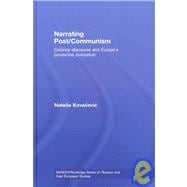
Note: Supplemental materials are not guaranteed with Rental or Used book purchases.
Purchase Benefits
What is included with this book?
| Introduction | p. 1 |
| Bleaching Eastern Europe's cultural "blackness" | p. 1 |
| Dissident narratives | p. 4 |
| "The Hinterland of the new European Reich": democracy's border or democracy's limit? | p. 11 |
| "Doubly obscure" dissident narrative: Vladimir Nabokov's Pale Fire | p. 21 |
| Writing "Nabokov" | p. 21 |
| Testimony tolof colonial overidentification | p. 29 |
| Charles Kinbote's monstrous (self-) re-presentations | p. 38 |
| Shifting topographies of Eastern/Central/Europe in Joseph Brodsky's and Czeslaw Milosz's prose writing | p. 44 |
| Typographies and topographies: writing Brodsky and Milosz | p. 44 |
| (De-)centering Europe | p. 48 |
| Joseph Brodsky, or the crescent meets the sickle and the hammer | p. 52 |
| New catastrophes in the air: Brodsky versus Brodsky | p. 60 |
| Czeslaw Milosz, or self-hating Slavs | p. 64 |
| Leaving the ghetto: journey to the West | p. 72 |
| Deviant stepchild of European history: communist Eastern Europe in Milan Kundera and Gunter Grass | p. 81 |
| "The mass production of martyr virtue": Kundera's graphomania before 1989 | p. 82 |
| History on speed: "imagology" and the politics of forgetting in Kundera's Slowness and Ignorance | p. 88 |
| Europe's "fanatical moderate": Gunter Grass and liberal discourse in crisis | p. 101 |
| The predicament of "Europe" in The Call of the Toad | p. 109 |
| Primitive accumulation and Neanderthal liberalism: Victor Pelevin, Gary Shteyngart, and criminal Eastern Europe | p. 116 |
| Criminal lands behind the Schengen curtain | p. 116 |
| Homo Zapiens: the path to your (ethnic) self is a shop | p. 122 |
| Inside the language of the market | p. 129 |
| Let us drown the Russian bourgeoisie in a flood of images | p. 133 |
| Che and the impossibility of revolution | p. 137 |
| Beta immigrants and mafia thugs: capitalism's "others" in The Russian Debutante's Handbook | p. 140 |
| The crime of refusing to work: reclaiming the time of capital | p. 146 |
| Conservative mimicry: capitulation into an alpha immigrant | p. 152 |
| Ethnicizing guilt: humanitarian imperialism and the case of (for) Yugoslavia | p. 156 |
| Critical intervention | p. 158 |
| Enjoy your bombing! Slavoj Zizek's ethnic hierarchies | p. 165 |
| Croatian, Balkan, Eastern European, or "other"? Dubravka Ugresic and the condition of global dissidence | p. 173 |
| Against pater/patria: Aleksandar Hemon's Sarajevo blues | p. 181 |
| Conclusion | p. 188 |
| Notes | p. 197 |
| Bibliography | p. 208 |
| Index | p. 218 |
| Table of Contents provided by Blackwell. All Rights Reserved. |
The New copy of this book will include any supplemental materials advertised. Please check the title of the book to determine if it should include any access cards, study guides, lab manuals, CDs, etc.
The Used, Rental and eBook copies of this book are not guaranteed to include any supplemental materials. Typically, only the book itself is included. This is true even if the title states it includes any access cards, study guides, lab manuals, CDs, etc.